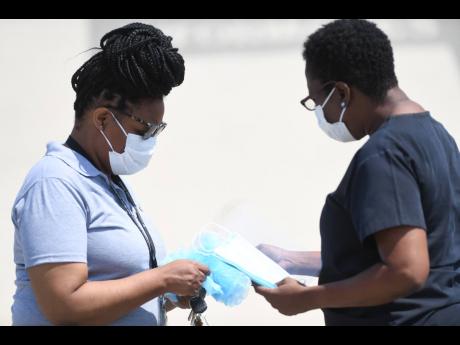Earth Today | EFJ faces down COVID-19
THE ENVIRONMENTAL Foundation of Jamaica (EFJ) is doing its part to safeguard the resilience of communities to natural disasters even as it faces down COVID-19, which has slowed the progress of a variety of its projects.
“The coronavirus pandemic has impacted the implementation of our projects. Most of our projects have community involvement, and most times it requires large groups of people executing activities under these projects,” explained Barrington Lewis, chief executive officer (CEO) for the EFJ.
With COVID-19 – which requires, among other things, physical distancing and the wearing of masks, together with frequent handwashing to prevent transmission – new ways have to be found to implement these project elements.
Sources of Funds
The EFJ manages just under a billion dollars in funding for projects from a number of sources, notably the Tropical Forest Conservation Agreement (TFCA); the Special Climate Change Adaptation Fund (SCCAF), which is financed by the Inter-American Development Bank through the Ministry of Economic Growth and Job Creation under the Pilot Programme for Climate Resilience; and the European Union/Forestry Department (EU/FD).
The TFCA currently funds nine projects, while the SCCAF supports 97 projects and the EU/FD, 27 projects. Since COVID-19, which has infected more than four million people and claimed in excess of 283,000 lives globally, some of those projects have been impacted.
“Some projects, which involve shipment of items from overseas suppliers, have experienced shipping delays; projects which include workshops, training sessions, meetings, construction activities, etc, and which involve more than 10 persons, have been delayed due to the restriction limiting the number of persons allowed to congregate,” Lewis explained.
“Projects which require that inspections be conducted for certification or approval purposes are awaiting resumption of these field activities in order to complete these components. Movement of project personnel in some areas has also been restricted due to strict quarantine measures, and this has limited the ability to execute some project components for which remote implementation is not feasible,” he added.
Concerning any protracted delays, Lewis said he was aware that the last few weeks had been difficult for their grantees but that they were committed to completing the projects as close to the scheduled deadlines as possible.
Challenging Time
“We are cognisant of the donor requirements, and so we are making every effort to have the projects completed in a timely manner. We do note that the last eight weeks have been particularly challenging on our grantees,” he said.
Meanwhile, Lewis said that the specific project impacts of the pandemic are being reviewed on a case-by-case basis and every effort made to find and implement solutions.
“Possible approaches include project extensions and amendments to affected project activities or objectives. In some instances, where possible, the feasibility of online meetings, workshops, training sessions is being or can be explored. Alternative forms of reporting or monitoring may also be considered if necessary such as via telephone or an online medium, and submission of video and/or photos,” he said.
“In some areas, even where some aspects of the projects could theoretically be implemented online, we are mindful that there may be added challenges associated with unreliable communication networks; previously unanticipated and therefore unbudgeted communication expenses, including availability of, and access to, devices, credit; and lack of familiarity with the available/appropriate technology. In these instances, we can review the specific project and determine what kind of assistance can be provided,” Lewis added.
As things stand, the CEO said the expectation is that four of the TFCA projects are to be completed within the next 12 months, and all 97 of the SCCAF projects. As for projects financed through the EU/FD, Lewis anticipates that the next year will yield the completion of 40 projects and explained how.
“For the EU/FD, 13 new grants were selected in February, but no disbursements have taken place to date. Also a call for proposals, which closed on April 9, will see some projects being awarded grant funding, and a few of these projects may be completed within the next 12 calendar months,” he said.

